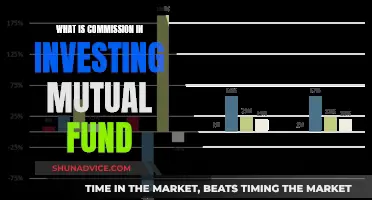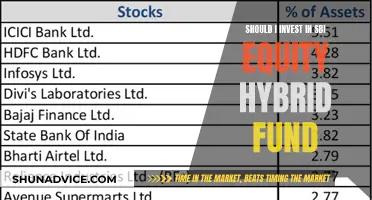
Money market funds are a type of mutual fund that invests in short-term, high-quality debt instruments, cash, and cash equivalents. They are considered extremely low-risk and are ideal for investors who want a quick and cost-effective way to earn a small profit. Money market funds are not suitable for long-term investment goals as they offer little capital appreciation.
Money market funds are a good option for those who want to earn a higher return than a traditional savings account while keeping a high level of liquidity. They are also a good choice for those who want easy access to their money at any time.
When choosing a money market fund, it is important to consider the type of fund, minimum investment requirements, the expense ratio, and average yield. It is also crucial to remember that money market funds are not insured by the Federal Deposit Insurance Corporation (FDIC) and are subject to market risks and interest rate fluctuations.
| Characteristics | Values |
|---|---|
| Type of Mutual Fund | Invests in short-term, low-risk debt securities |
| Liquidity | High |
| Risk | Low |
| Returns | Lower than other mutual funds |
| Interest Rates | Higher than traditional savings accounts |
| Regulation | Regulated by the U.S. Securities and Exchange Commission (SEC) |
| Protection | Not insured by the Federal Deposit Insurance Corporation (FDIC) |
What You'll Learn

Money market funds vs money market accounts
Money market funds and money market accounts are both low-risk investment options, but they have some important differences.
Money Market Funds
Money market funds, also known as money market mutual funds, are a type of mutual fund that invests in short-term, high-quality debt instruments, cash, and cash equivalents. They are considered extremely low-risk and offer high liquidity, making them a good option for investors who want to protect their savings while earning some interest. Money market funds are not insured by the Federal Deposit Insurance Corporation (FDIC) and are not backed by the government. This means that there is a small risk of losing money. Money market funds are also not federally regulated, and returns may fluctuate based on the underlying investments held in the fund. While money market funds don't have transaction fees, they may charge management fees, also known as expense ratios.
Money Market Accounts
Money market accounts, on the other hand, are federally insured liquid bank accounts. They are similar to savings accounts but typically offer higher interest rates. Money market accounts are insured by the FDIC or the National Credit Union Administration (NCUA) for up to $250,000 per depositor, making them a very safe investment option. However, money market accounts usually come with transaction limits, such as a restriction of six withdrawals per billing statement period. Money market accounts also tend to have higher minimum balance requirements and may charge service fees if the balance drops below a certain limit.
Comparison
Both money market funds and money market accounts offer high liquidity and low risk. Money market funds typically offer slightly higher interest rates than money market accounts, but they are not insured and may have management fees. Money market accounts, on the other hand, are insured and offer the protection of federal deposit insurance, but they have transaction limits and higher minimum balance requirements.
A Simple Guide to Investing in Fidelity 500 Index Funds
You may want to see also

How money market funds work
Money market funds are a type of mutual fund that invests in low-risk, short-term debt securities. They are designed to offer a safe, stable investment option for money that may be needed in the short term, such as an emergency fund or a short-term goal. Money market funds are different from money market accounts, which are typically offered by banks and credit unions and insured by the Federal Deposit Insurance Corporation (FDIC).
Money market funds work similarly to other mutual funds. They issue redeemable units or shares to investors and follow guidelines set by financial regulators, such as the U.S. Securities and Exchange Commission (SEC). Fund shareholders can typically withdraw their money at any time, but there may be a limit on the number of withdrawals within a certain period. Money market funds invest in various debt-based financial instruments, including bankers' acceptances, certificates of deposit, commercial paper, repurchase agreements, and U.S. Treasuries.
The returns from these instruments depend on the applicable market interest rates, so the overall returns from money market funds are also dependent on interest rates. Money market funds aim to maintain a net asset value (NAV) of $1 per share, and any excess earnings are distributed to investors as dividend payments.
Money market funds are considered extremely low-risk and are a popular choice for investors seeking a safe and stable investment option. They are also cost-effective, as they typically have no fees when cash joins or leaves the fund, and there can be tax benefits as well.
Investment Banking vs. Hedge Funds: Why Choose Banks?
You may want to see also

Why invest in money market funds
Money market funds are a good investment option for those seeking a short-term, low-risk opportunity to grow their savings. Here are some reasons why investing in money market funds can be beneficial:
Low Risk and High Liquidity
Money market funds are considered extremely low-risk investments due to their focus on high-quality, short-term debt instruments, cash, and cash equivalents. These funds aim to maintain a stable net asset value, typically $1 per share, providing investors with easy access to their money. The high liquidity of these funds means that investors can quickly convert their assets into cash if needed.
Competitive Interest Rates
Money market funds generally offer higher interest rates than traditional savings accounts and money market accounts. This makes them an attractive option for those seeking to earn a higher return on their short-term investments. The interest rate paid by money market funds is usually on par with or slightly higher than bank savings accounts.
Cost Efficiency
Money market funds are cost-effective as they typically do not charge transaction fees when your cash joins or leaves the fund. Additionally, some money market funds hold municipal securities that are exempt from federal and state taxes, providing tax benefits to investors.
Protection for Savings
Money market funds are ideal for those who want to protect their savings while still earning interest. They are a good option for investors who may need quick access to cash for emergencies or who are anticipating a near-term cash outlay.
Convenience and Accessibility
Money market funds are easily accessible through brokerage accounts and can be purchased directly from brokerage companies, mutual fund firms, or even some banks. They are also convenient for investors who want to keep cash holdings within their brokerage accounts, providing ready funds for investment opportunities.
In summary, money market funds offer a combination of low risk, high liquidity, competitive interest rates, cost efficiency, and convenience, making them a compelling choice for those seeking short-term investment opportunities.
Hedge Funds: Investing in Your Business and You
You may want to see also

How to invest in money market funds
Money market funds are a type of mutual fund that invests in short-term, high-quality, low-risk debt securities. They are considered an extremely low-risk investment option and are ideal for investors who want quick and easy access to their money.
Step 1: Open a Brokerage Account
To start investing in money market funds, you will need to open a brokerage account with an online trading platform or an investment app. Most brokers will ask for personal information, such as your social security number and annual income.
Step 2: Determine Your Investment Amount
Money market funds often have initial investment requirements, so it's important to know how much you want to invest. Consider your short-term investment goals, risk tolerance, and overall financial circumstances when making this decision.
Step 3: Choose a Money Market Fund
There are different types of money market funds, including government, municipal, and prime funds, each with varying levels of risk and returns. Compare features like the expense ratio, minimum investment requirements, and interest rates to find the fund that best aligns with your goals and risk tolerance.
Step 4: Place Your Order
Once you have selected the fund that meets your criteria, it's time to place your order and make your investment.
Step 5: Monitor Your Investment
Remember that money market funds are typically suited for short-term investment strategies. Regularly monitor your investment to ensure it aligns with your goals and make adjustments as necessary.
When choosing a money market fund, it is important to consider factors such as the type of fund, minimum investment requirements, the expense ratio, and average yield. Additionally, remember that money market funds are not insured by the Federal Deposit Insurance Corporation (FDIC) and are subject to market risks and fluctuations in interest rates.
Choosing the Right Brokerage: Investment Funds Explained
You may want to see also

Money market funds disadvantages
Money market funds are a type of mutual fund that provides investors with access to the money market. They are considered an extremely low-risk investment option, but they do come with some disadvantages. Here are some key drawbacks to consider before investing in money market funds:
- Lower long-term returns: Money market funds are not ideal for building long-term savings, including retirement funds. While they are stable and safe, they offer lower returns compared to other investments like stocks or equity mutual funds, which have the potential for higher annual returns.
- No FDIC protection: Money market funds are not insured by the Federal Deposit Insurance Corporation (FDIC). This means that, unlike money market accounts or bank savings accounts, there is no guarantee of principal. In the rare event of a fund's net asset value falling below $1, investors could lose money.
- Risk of losing value: Money market funds are considered safe, but they are not completely risk-free. The value of the fund's investments can fluctuate, and there is a chance that one of the issuers of the securities held by the fund could default. Additionally, the financial institution managing the fund could face financial troubles, which may impact the ability to recover investments.
- Limited withdrawals: While money market funds are highly liquid, there is no guarantee that investors can withdraw their money whenever they want. Fund managers have the authority to restrict access or limit withdrawal amounts, especially during volatile or uncertain market conditions.
- Inflation risk: Money market funds may not keep up with inflation, causing investors to lose purchasing power over time. When interest rates are low, these funds may pay less than the inflation rate, resulting in a loss of value for investors.
Bond Index Funds: A Smart, Diversified Investment Strategy
You may want to see also
Frequently asked questions
Money market funds are a type of mutual fund that invests in short-term, low-risk debt securities such as U.S. Treasury bills, municipal bonds, commercial paper, and other cash equivalents. They are considered extremely low-risk and aim to provide high liquidity.
Money market funds work like a typical mutual fund. They issue redeemable units or shares to investors and follow the guidelines set by financial regulators. Fund shareholders can typically withdraw their money at any time but may have a limit on the number of withdrawals within a certain period.
Money market funds are suitable for those who want to earn a higher return than a traditional savings account while maintaining a high level of liquidity. They are ideal for short-term investment goals and those who want quick access to cash for emergencies.
The process is similar to investing in stocks. First, open a brokerage account with an online trading platform or investment app. Then, determine how much you want to invest, choose a specific money market fund, and place an order. Finally, regularly monitor your investment to ensure it aligns with your goals.
Money market funds offer high liquidity, relatively low risk, and higher interest rates than traditional savings accounts. However, they have operating and administrative costs, provide lower returns than other mutual funds, and are not insured by the Federal Deposit Insurance Corporation (FDIC).







